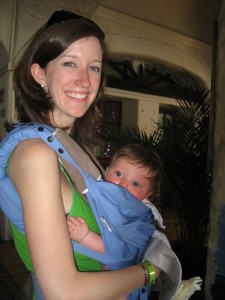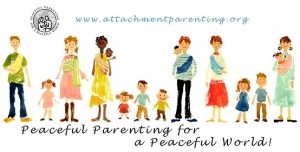Ah, sleep issues. Those without them don’t understand the fuss (cough, cough, Allison, in this post about her amazing sleeper!), and those with them . . . Well, they’re just trying to survive! Austin Moms Blog was lucky enough to get a guest blog from sleep consultant Nicole Johnson from the super-helpful The Baby Sleep Site about two hot topics in the Austin mommy world: Attachment Parenting and sleep training. Is it possible to do BOTH? I was personally very AP in the beginning, as many Austin mamas are, but quickly learned that sometimes “bonding” becomes “bondage” (specifically, nursing became a sleep crutch for V). It was time to sleep train, and it was beyond difficult, but we are all better for it! So, without further ado . . .
Can You Mix Attachment Parenting and Sleep Training?
Becoming a parent is one of the most fulfilling and rewarding jobs that a person can have. So, it is understandable that many new parents will research and read up on the wide variety of parenting philosophies and approaches as a way to help them better understand how they want to raise and parent their child. Many will find an abundance of information available about attachment parenting.
Attachment parenting (a phrase coined by pediatrician William Sears over 20 years ago) is an approach to parenting that promotes strong bonds between parent and child. Attachment parents believe that this approach will create bond that will fulfill a child’s basic emotional needs and will provide a foundation for healthy relationships throughout the child’s life. However, attachment parenting is about much more than exclusively breastfeeding, or adopting the practice of sleeping in a “family bed” (although those are characteristics of attachment parenting).

At its core, attachment parenting is based on eight principles (as identified by Attachment Parenting International):
1. Prepare for Pregnancy, Birth, and Parenting
2. Feed With Love and Respect
3. Respond with Sensitivity
4. Use Nurturing Touch (API recommends skin-to-skin contact and babywearing.)
5. Ensure Safe Sleep, Physically and Emotionally (API recommends safe co-sleeping.)
6. Provide Consistent and Loving Care
7. Practice Positive Discipline
8. Strive for Balance in Personal and Family Life
Any parenting philosophy that promotes healthy and positive relationships should be applauded, but not every parent has to whole heartedly embrace these eight principles to have a strong and healthy relationship with their child. You might embrace all eight principles of attachment parenting and use them as the basis for your parenting style. Or, your instincts might lead you to practice some attachment principles while skipping or modifying others. Both approaches are perfectly acceptable; attachment parenting doesn’t have to be an “all-or-nothing” affair.
Whether you’re a committed attachment parent or not, anyone who’s done a bit of research on the topic can tell you that the practice of sleep training is generally frowned upon by those who promote attachment parenting. In general, attachment parents believe that allowing a baby to cry, without intervening and offering comfort, damages the bond between parent and child. This isn’t a bad theory, of course, but we at The Baby Sleep Site find that many families simply cannot function on lack of sleep for months and years (sleep deprivation isn’t a form of torture for nothing!). After all, what’s a mom to do when she’s waking ten times a night with a breastfeeding, pacifier-demanding, rocking-addicted baby?
We say sleep train!
The fact is that you CAN mix attachment parenting with sleep training — you just may need to modify your understanding of what sleep training actually means. Sleep training does NOT have to mean controlled crying or cry it out or any other variation of it. There are a variety of ways parents can help their babies overcome sleep associations and learn to fall asleep on their own, and not all of them involve tears . In our mind, sleep training is just another way of saying that you are teaching your child to learn healthy sleep habits. Our job as parents is to teach our children how to do many, many things and teaching them how to sleep can be one of them.
It’s important to remember, too, that crying is a baby’s way of communicating. As adults, we tend to want to do anything (and everything.) to stop the tears because we feel that any crying is a sign of deep distress. That reaction is perfectly natural and healthy, but the reasoning behind it isn’t always true. It isn’t as if your baby can say to you, “Mommy, I’m hungry” or “Mommy, I’m a little tired.” Crying is the only means of communication they have.
Similarly, if you sleep train, your baby isn’t going to calmly say to you, “Mommy, why aren’t you feeding me to sleep anymore? I don’t really like that. I’m sleepy and now I can’t sleep because YOU decided you were going to make some changes to my routine. I don’t like to change my routine much, even if I might be fine with it in a week.” Your baby may shed a few tears during the process, but that’s okay — sometimes, a bit of crying can lead to sleeping, and you can be there every step of the way!
You may feel like your baby can’t self-soothe and will never learn to put himself to sleep. But remember: just because he can’t self-soothe now doesn’t mean he can’t do it at all, does it? It’s possible for him to learn, and it’s possible for you to teach him to do it with a minimum of tears and in a nurturing, supportive way.
About The Baby Sleep Site™:The Baby Sleep Site™ (http://babysleepsite.com) is owned and operated by Nicole Johnson, a baby and toddler sleep coach, and the mother of two young boys. More than 300,000 parents visit The Baby Sleep Site™ each month to find solutions for their children’s sleep problems, including personalized, one-on-one sleep consultations, comprehensive e-books on sleeping through the night, schedules and taking better naps, free articles and blogs on timely topics and strong community. (Jessica’s note: I love the newsletters!! Sign up!)
So, Austin mamas, did you sleep train, or are you super AP and think sleep training is the devil?!?













Great post! I could have definitely used the sleep training piece. We weren’t attachment parents but we did end up having a family bed by default. Caroline was a terrible sleeper until she was 18 months (probably because both of her parents weren’t living under the same roof) and we would bring her into bed with us for our sanity. Thanks for the blog, Nicole!
I have a 7.5 month old sweet girl named Chloe, who is still struggling a bit. I have tried everything from tending to her every nightly demand, letting her cry it out for 2 hours to no avail, and giving in, to the Ferber method. Nothing had worked. To this day, a “normal night for her is falling asleep between 8:30 and 9:30, and waking up for a feeding between 3 and 4. She wakes up for the day between 7 and 8. Does this sound normal to you girls? About once of twice a week, though she’ll decide she wants a snack at about 2am. This is the feeding I have “experimented” on, and nothing seems to work. Any suggestions girlies??
That sounds perfect what she is doing right now. I am not sure you know how lucky you are. She is still little and breast fed babies get hungry.
My 5 month old is doing the same. My doc said she is probably just hungry. Some kids just don’t sleep long periods till 9-12 months.
I think it’s important to encourage discussion, an educated and balanced look at both sides, and to avoid judgment. Lots of AP parents cosleep; others don’t. The common ground is honoring sleeptime needs.
Contrary to popular belief, AP isn’t child-centered and based on parent martyrdom. It’s family-centered; it’s seeing each member of the family as equally deserving of respect, love, empathy, and value. Yes, a baby communicates through crying, as well as many other vocalizations. A baby cries when distressed; when not distressed, the baby makes other noises like grunts and eventually babbling. The cornerstone of AP is responding to your child sensitively. This means being sensitive to your baby’s crying. If you were in distress, it would be inappropriate for a person to ignore that distress as a way to teach you a new routine. Rather, it is appropriate to ease you into the new routine…especially if you don’t quite understand the other person’s language.
Every child is different, too. It’s impossible to have a one-size-fits-all sleep strategy. I liken it a bit to potty training; a child learns to go to sleep on his/her own when he/she is ready. We can encourage, we can guide, but it is ultimately up to the child. Every child has a unique temperament as well. Some children can be eased into a new sleep routine more smoothly than others. Some children react to a lack of parental support at nighttime by acting out in other ways, such as pottying regression or more easily triggered tantrums. Some are so sensitive that they can experience depression-like symptoms.
Many parents also find cosleeping to be an excellent way to extend bonding around the clock, especially parents who need to work outside the home. For many AP mothers, cosleeping is a way to get MORE sleep, especially if they’re breastfeeding. But not all AP families cosleep — what’s important is to respond to your child’s sleeptime needs sensitively. Say you have a child who sleeps well in a crib all night, and say you have another child who needs more physical closeness to feel secure. You’ll have fewer power struggles and a much closer relationship overall if you’re able to honor each child’s unique needs.
I think it’s important to encourage discussion, an educated and balanced look at both sides, and to avoid judgment. Lots of AP parents cosleep; others don’t. The common ground is honoring sleeptime needs.
Contrary to popular belief, AP isn’t child-centered and based on parent martyrdom. It’s family-centered; it’s seeing each member of the family as equally deserving of respect, love, empathy, and value. Yes, a baby communicates through crying, as well as many other vocalizations. A baby cries when distressed; when not distressed, the baby makes other noises like grunts and eventually babbling. The cornerstone of AP is responding to your child sensitively. This means being sensitive to your baby’s crying. If you were in distress, it would be inappropriate for a person to ignore that distress as a way to teach you a new routine. Rather, it is appropriate to ease you into the new routine…especially if you don’t quite understand the other person’s language.
Every child is different, too. It’s impossible to have a one-size-fits-all sleep strategy. I liken it a bit to potty training; a child learns to go to sleep on his/her own when he/she is ready. We can encourage, we can guide, but it is ultimately up to the child. Every child has a unique temperament as well. Some children can be eased into a new sleep routine more smoothly than others. Some children react to a lack of parental support at nighttime by acting out in other ways, such as pottying regression or more easily triggered tantrums. Some are so sensitive that they can experience depression-like symptoms.
Many parents also find cosleeping to be an excellent way to extend bonding around the clock, especially parents who need to work outside the home. For many AP mothers, cosleeping is a way to get MORE sleep, especially if they’re breastfeeding. But not all AP families cosleep — what’s important is to respond to your child’s sleeptime needs sensitively. Say you have a child who sleeps well in a crib all night, and say you have another child who needs more physical closeness to feel secure. You’ll have fewer power struggles and a much closer relationship overall if you’re able to honor each child’s unique needs.
I love this article! from personal experience I would absolutely say, that you can mix attachment parenting and sleep training. there are so many gentle ways to do it (no cry-it-out) and there are so many mums exhausted or even near to postnatal depression because of sleep deprivation. so thank you for bringing this subject up. by the way, I was a member at the babysleepsite and was very happy about their ressources. so I second your recommandation. 🙂